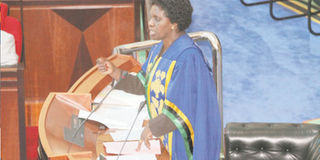Which form of parliament will we adopt?

National Assembly Speaker Anne Makinda explains to Members of Parliament House proceedings in Dodoma. PHOTO | FILE
What you need to know:
- In this article, however, I am not intending to give a lecture on all three branches of government, rather I would like to comment on the current type of our Parliament at this stage of constitution making, and see if there is a reason for change.
Dar es Salaam. The modern administrative system of any democratic state is governed by the doctrine of separation of powers.
This is the doctrine and practice of dividing the powers of the state (government) among different branches to guard against abuse of power.
These branches are historically known as the legislature, the executive and the judiciary. In this article, however, I am not intending to give a lecture on all three branches of government, rather I would like to comment on the current type of our Parliament at this stage of constitution making, and see if there is a reason for change.
The legislature or Parliament is a law making branch of the state.
In 14th century, the British Parliament was split into two houses or chambers - the House of Commons and the House of Lords, these being lower and upper houses respectively for the task of making laws.
From this long historical background of British Parliament, England is taken for granted as the mother of parliaments although schools of thought differ as to the origin of Parliament.
There are commonly two types of Parliament that exist in the world today. One is that of single House Assembly (unicameral), just like our current Parliament, and the other is the one that consists of two parts (bicameral) both responsible for the legislative function.
The names for these types of legislatures differ from one country to another, but the most common ones are the House of Representatives and Senate as in the United States of America, or the House of Commons and the House of Lords as in the United Kingdom (Great Britain and Northern Ireland) or the National Assembly and the Senate, as in Kenya after the new Constitution of 2010.
Since the division of British Parliament into two parts, many countries in the world have adopted that system of the UK of bicameral and others remained unicameral.
Tanzania’s legislature, before and after independence remained unicameral, and of course, many African parliaments after independence adopted the unicameral system.
Today, many legislatures in American and European continents are bicameral, and few are still unicameral. Of late, many African legislatures have shifted to bicameralism as a way of improving basic functions of their parliaments.
Among five countries of the East African Community, only two legislatures are unicameral and three are bicameral. The former are Uganda and Tanzania, and the latter are Burundi, Kenya and Rwanda. The Parliament of Kenya, before the new Constitution was unicameral, but it is now bicameral. Will Tanzania go into bicameralism after the new Constitution?
The advantages of having the Parliament of two chambers are not so obvious, but definitely there are; otherwise we could not see a new trend of African legislatures opting for bicameralism from unicameralism. There is no common system on how to establish the Parliament of two chambers.
Each country can devise its own procedure on how to form the legislature of two parts. In some countries, the Parliament of both chambers is drawn from the people through elections as it is the case with the United States and our neighbouring Kenya, and probably Burundi and Rwanda.
In the UK, members of the House of Commons are elected, while members of the House of Lords are monarch appointees.
Regardless of the systems that used to get the members of the both Houses, their roles are almost the same in every country – the balance of decisions that might be caused by hasty debates of a single House.
The common rationale for having the legislature of two chambers is to balance the basic functions that are performed by the legislature. The first part of the legislature is that of elected representatives, and their first job is to represent their electorate well.
The representatives are known to have inclinations in defending their constituencies and thus can easily ignore or overlook certain issues of national interest.
This kind of inclination can be balanced by the second part of the House, which can prioritise national interest than that of respective constituencies.
For instance, some of the Bills can be initiated by any House, but the same must be sent to another House for deliberation before being sent to the President or Monarch for assent.
The experience of Parliament of one single assembly like in our case now, is that, the Bills are hastily and sometimes not well worked out before being sent for assent by President.
Thus, in order to have keen deliberations of the Bills and other national issues, the formation of Parliament with two chambers is indispensable at this era of political pluralism and demand for good governance.
For the case of Tanzania, if at all we decide to go for bicameral Parliament, one of the possibility is to have the National Assembly that is formed by representatives elected from each constituency and the second part, call it the senate or anything, whose members may be elected, but represent equal number from each region, say two; then we will have a senate of 50 senators.
We can set as many qualifications as possible for getting members of the second chamber of Parliament. Nevertheless, it should be well understood that having two chambers of the legislature does not necessarily cost more than a single House; it all depends on the kind of mechanism used to form that bicameral Parliament.
The author is a journalist and lawyer based in Dar es Salaam. He can be reached at [email protected], 0712943472.


